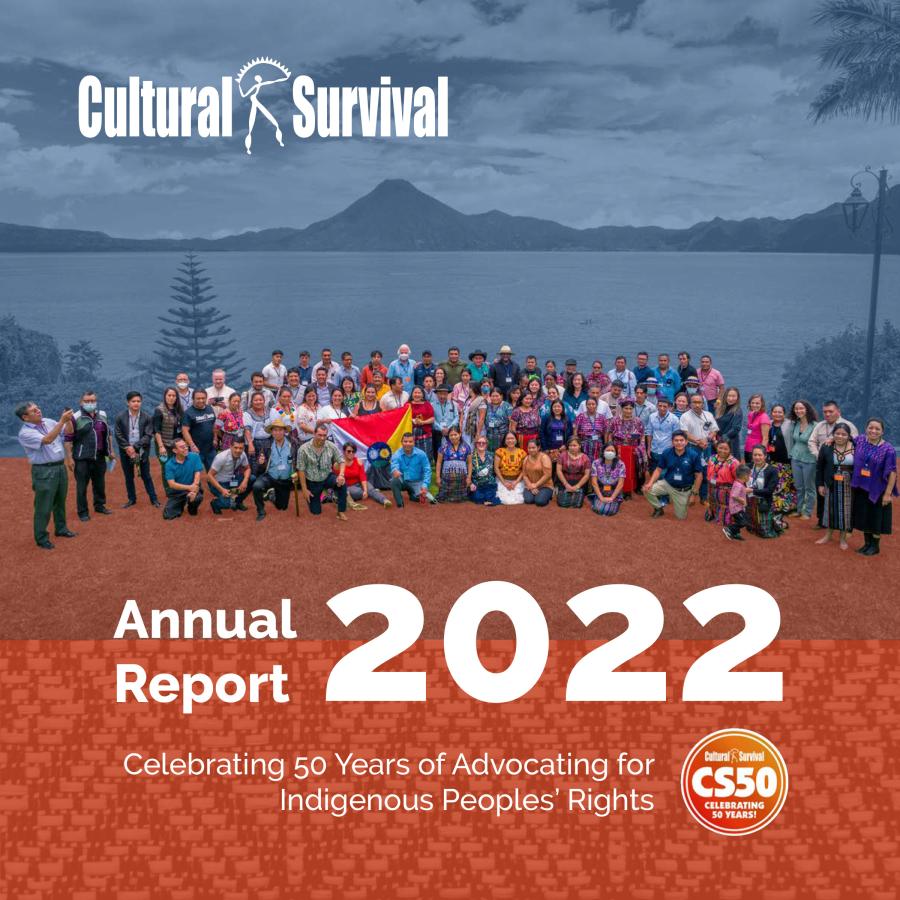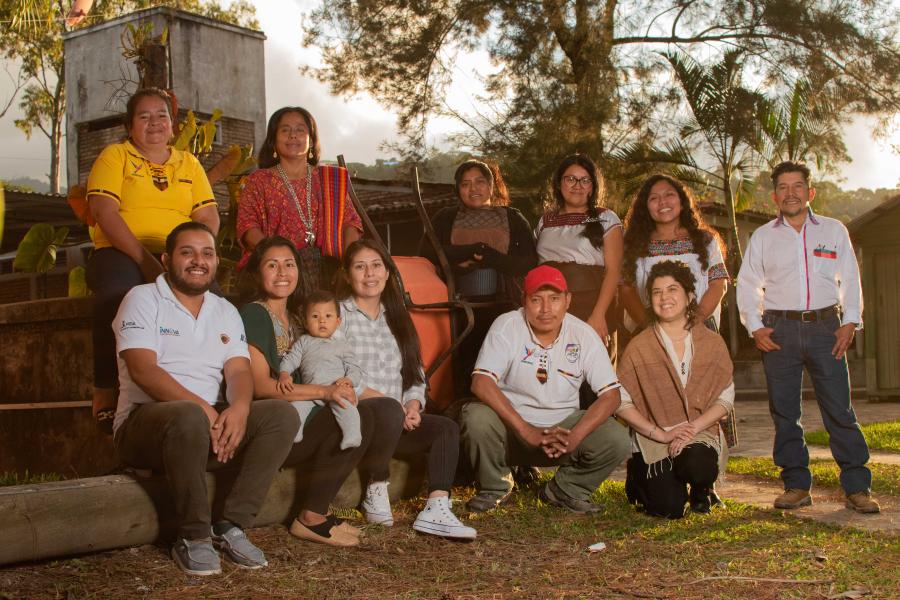
By Edson Krenak (Krenak, CS Staff) in collaboration with APIB
Indigenous Peoples have long participated in international gatherings, often bearing witness to how the lack of leadership, vision, and decisive action perpetuates injustices and exacerbates the multiple crises facing the world. The G20 Summit is no exception.
With a powerful symbolic protest, the Articulation of Indigenous Peoples of Brazil (APIB) held a peaceful demonstration in Rio de Janeiro on November 16, 2024, to condemn the inaction of the world’s wealthiest and most polluting nations in tackling the global climate crisis. China, the United States, India, the European Union, Russia, and Japan are the biggest polluting countries in the world. They had images of their leaders placed in the water against the backdrop of Pão de Açúcar - Sugarloaf Mountain.
Climate change is already causing many impacts on forests, rivers, and oceans. Cities are experiencing high heatwaves and record rainfall with much greater frequency. These impacts widely documented by science, the media, and the communities facing them firsthand, can be mitigated and even prevented if decisive, courageous actions and committed leadership are undertaken.
If the climate crisis is not placed at the center of G20 discussions and other global agendas, issues like world hunger—highlighted by Brazil—could become even harder to address. Water scarcity, the destruction of crops due to frequent flooding, and other climate-related challenges will only exacerbate these existing problems. Indigenous Peoples are underscoring through this protest statement the climate crisis is fundamentally a crisis of leadership and values.
G20 Summit vs. Indigenous Leadership
The demonstration took place just two days before the G20 Summit, hosted in the same city, and served as the launch of Indigenous mobilization for COP30, the 30th session of the UN Framework Convention on Climate Change, set to be held in Brazil in 2025. Among other Indigenous communities, demands that the demarcation of Indigenous lands be recognized as a critical climate policy, positioning Indigenous Peoples as active leaders in global climate decision-making processes. Dinaman Tuxá, APIB’s Executive Coordinator, stated, “We, Indigenous Peoples, demand that the demarcation of Indigenous lands be recognized as climate policy and an effective solution to the climate crisis, asserting our right to an active and leading role in global decisions that impact the planet's future.”
A document by Indigenous organizations and other social movements, delivered to the leaders of the world's wealthiest countries, also added the following key demands:
- DEMARCATING INDIGENOUS LANDS IS CLIMATE POLICY
- FOR AMBITIOUS AND DIRECT CLIMATE FINANCING
- FOR THE DEVELOPMENT OF A NATIONAL ADAPTATION PLAN FOR INDIGENOUS PEOPLES
- AGAINST THE MERCOSUR - EUROPEAN UNION FREE TRADE AGREEMENT
- FOR A JUST ENERGY TRANSITION: AN END TO FOSSIL FUELS WITHOUT MINING IN INDIGENOUS TERRITORIES
- FOR TAXING BILLIONAIRES AND ENDING SUBSIDIES FOR POLLUTERS
- WE DEMAND AN Indigenous AND INDEPENDENT CO-PRESIDENCY FOR COP30
- FOR THE IMPLEMENTATION OF THE EUROPEAN ANTI-DEFORESTATION LAW (EUDR)
These demands arise from the urgency of the global climate crisis we are all facing. Amazonian rivers, African shores, Asian islands, and Arctic regions are experiencing a collapse of living conditions, and Indigenous Peoples are struggling to cope without resources. This is why many organizations reject the empty discussions and inadequate commitments made by world leaders at the G20, COPs, and the UN Security Council. Indigenous Peoples’ organizations have emphasized that they are ready to take the lead in a global mobilization to safeguard life on Earth, positioning themselves as key agents in the fight for the planet's future.
The “We Are the Answer” Campaign
Indigenous Peoples kicked off the campaign, We Are the Answer, highlighting the essential role of Indigenous Peoples in addressing the climate crisis, and it calls for immediate and genuine action. Supported by many partners and coalitions, the protest focused on the urgent need for G20 countries—responsible for over 80 percent of global wealth and greenhouse gas emissions—to take decisive steps towards a truly just transition. (See Indigenous Peoples` perspective on Just Transition.)
With February's deadline for updated Nationally Determined Contributions (NDCs) fast approaching, the world’s richest nations bear the responsibility to drive transformative change. NDCs outline each country's commitment to cutting greenhouse gas emissions, specifying targets, adaptation measures, and the strategies and timelines planned to achieve these objectives in response to climate change. The strong movement of Indigenous Peoples in Brazil are calling the country, as the host of the UNFCCC COP30 in 2025, to set a bold example. However, without a collective action a single voice cannot do much.
The Global Funding Gap
At the Convention on Biological Diversity COP16, in October 2024 in Cali, Colombia, Indigenous leaders celebrated key milestones due to their leadership, such as the approval of Article 8(j), which recognizes the critical role of Indigenous knowledge in biodiversity conservation, and the creation of the Cali Fund to ensure fair benefit-sharing from genetic resource data.
However, significant and historical gaps remain, including a failure to establish a robust funding mechanism that is accessible and efficient, progress on resource mobilization where the rich countries are failing to commit to their part to secure the funds, and recognition of Indigenous territories as distinct conservation areas - the main message and demand of Indigenous Peoples in Brazil of land demarcation.
Afro-descendant communities, like Quilombola people in Brazil, also saw partial recognition but were disappointed by the lack of acknowledgment of their collective identity and autonomy, which has been their cornerstone for centuries. Indigenous leaders emphasized the urgency of direct financial support and participatory dialogue to address global biodiversity goals, as only 22 percent of countries have submitted updated biodiversity plans. While progress was made, the outcomes highlighted the need for stronger commitments to Indigenous-led solutions and equitable resource allocation. Our problem is the G20 leaders are the same countries falling short on these commitments.
A study by the UN’s Independent High-Level Expert Group on Climate Finance reveals that developing countries (excluding China) require $2.4 trillion annually by 2030 to fund climate solutions, including renewable energy, biodiversity conservation, and climate adaptation. However, recent failures, such as the underwhelming outcomes of the CBD COP16 and the $7 trillion in subsidies allocated to oil companies in 2022, highlight the global reluctance to prioritize climate action. However, over 80 percent of countries have not submitted plans to fulfill a UN agreement aimed at stopping the destruction of Earth’s ecosystems. Indigenous Peoples need those funds to guarantee the protection of their diverse, rich and green areas, their territories.
At COP16, financial disagreements between developed and developing nations blocked the creation of a new global biodiversity fund, leaving critical funding decisions postponed to intersessional talks, when less visibility compromised accountability. The $711 billion annual biodiversity funding gap remains unresolved, with existing mechanisms like the Global Environment Facility, cited above, criticized for inefficiency and limited direct support for Indigenous Peoples.
Efforts to finalize monitoring indicators for the Kunming-Montreal Global Biodiversity Framework (KMGBF), essential for tracking progress, were also deferred due to resource mobilization disputes. Indicators such as land-use change and Indigenous land tenure still need to be approved, delaying accountability tools critical for biodiversity protection. Colombia and Brazil presented a declaration on traceability and accountability in the transition minerals sector, proposing an intergovernmental working group to ensure sustainable and transparent mining practices. But at least Brazil is failing to protect Indigenous and Quilombola Peoples’ rights in the context of transition mineral mining. “Continuing policies that prioritize corporate profits over community protection is unsustainable,” said Tuxá. “The wealthiest nations must fund climate solutions for those, like Indigenous Peoples, who are on the frontlines of this crisis.”
Indigenous Peoples: The True Climate Leadership
At Climate COP26, promises from countries like the UK, the US, Germany, and others totaled $1.7 billion for Indigenous Peoples, but only 7 percent of those funds reached Indigenous organizations directly. Mogabay reported some time ago that one of the largest in the world, “the environmental NGO Rainforest Foundation Norway (RFN), has reported on the dearth of [Indigenous Peoples and local communities’] support, noting in a 2021 report that less than 1 percent of climate-related aid goes directly to these groups. RFN has also worked as an intermediary with [Indigenous Peoples and local communities] in places like Indonesia.”
“The funds exist, but they are not being allocated where they’re most needed,” said Kleber Karipuna, Executive Coordinator at APIB. “We need the political courage to end fossil fuel dependence, accelerate a just transition, and ensure support reaches those who have consistently protected the planet. Indigenous Peoples are the true climate authorities, and we will not stand by as this crisis deepens.”
A Call to Action
Indigenous Peoples are sending a resounding message: without Indigenous leadership and equitable climate financing, the world’s wealthiest nations cannot hope to address the climate crisis effectively. The road to COP30 must prioritize justice, bold commitments, and inclusive solutions led by those who have defended the planet for generations.
Top photo: Demonstrators stood before images of leaders from the world's wealthiest and most polluting nations—China, the United States, India, the European Union, Russia, and Japan—placed in the water against the backdrop of the iconic Sugarloaf Mountain (Pao de Acucar). Photo by APIB.



